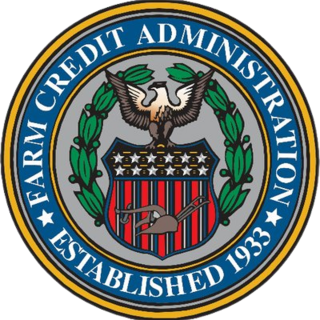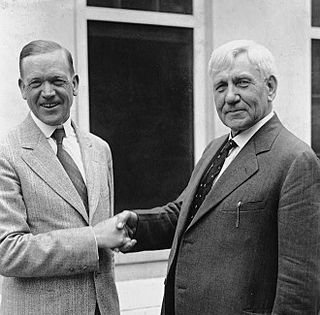
The Farm Credit Administration is an independent agency of the federal government of the United States. Its function is to regulate the financial institutions that provide credit to farmers.

The National Grange, a.k.a. The Grange, officially named The National Grange of the Order of Patrons of Husbandry, is a social organization in the United States that encourages families to band together to promote the economic and political well-being of the community and agriculture. The Grange, founded after the Civil War in 1867, is the oldest American agricultural advocacy group with a national scope. The Grange actively lobbied state legislatures and Congress for political goals, such as the Granger Laws to lower rates charged by railroads, and rural free mail delivery by the Post Office.

The American Farm Bureau Federation (AFBF), more informally called the American Farm Bureau (AFB) or simply the Farm Bureau, is a United States-based 501(c)(5) tax-exempt agricultural organization and lobbying group. Headquartered in Washington, D.C., the Farm Bureau has affiliates in all 50 states and Puerto Rico. Each affiliate is a (state or county) Farm Bureau, and the parent organization is also often called simply the Farm Bureau.

The Farmers' Alliance was an organized agrarian economic movement among American farmers that developed and flourished ca. 1875. The movement included several parallel but independent political organizations — the National Farmers' Alliance and Industrial Union among the white farmers of the South, the National Farmers' Alliance among the white and black farmers of the Midwest and High Plains, where the Granger movement had been strong, and the Colored Farmers' National Alliance and Cooperative Union, consisting of the African American farmers of the South.
The Michigan Farm Bureau was founded on the campus of Michigan State University in 1919. The organization's primary goal is to promote and represent the interests of its agricultural members within the state of Michigan.

The McNary–Haugen Farm Relief Act, which never became law, was a controversial plan in the 1920s to subsidize American agriculture by raising the domestic prices of five crops. The plan was for the government to buy each crop and then store it or export it at a loss. It was co-authored by Charles L. McNary (R-Oregon) and Gilbert N. Haugen (R-Iowa). Despite attempts in 1924, 1926, 1927, and 1931 to pass the bill, it was vetoed by President Calvin Coolidge, and not approved. It was supported by Secretary of Agriculture Henry Cantwell Wallace and Vice President Charles Dawes.
The Farm Credit System (FCS) in the United States is a nationwide network of borrower-owned lending institutions and specialized service organizations. The Farm Credit System provides more than $373 billion in loans, leases, and related services to farmers, ranchers, rural homeowners, aquatic producers, timber harvesters, agribusinesses, and agricultural and rural utility cooperatives.

National Farmers Union is a national federation of state Farmers Union organizations in the United States. The organization was founded in 1902 in Point, Texas, and is headquartered in Washington, D.C.. The organization was created to protect and enhance the economic well-being and quality of life for family farmers, ranchers, and their rural communities by promoting legislation and education beneficial to farmers, and developing cooperative buying and selling methods and businesses. NFU advocates for the sustainable production of food, fiber, feed, and fuel. The current president is Rob Larew, and the vice president is Jeff Kippley. Former NFU Presidents have included Roger Johnson, Tom Buis, and David Frederickson.

The Illinois Farm Bureau (IFB) is a nonprofit U.S. organization controlled by farmers who join the IFB through one of the 96 county Farm Bureaus in Illinois. The organization's legal name is the Illinois Agricultural Association. The IFB was founded in 1916 by a group of farmers who met at the University of Illinois to discuss the need for agricultural education, better information for farmers, and more effective farming practices. Modernly, the IFB represents two out of three Illinois farmers.

The Oklahoma Department of Agriculture, Food, and Forestry is a department of the government of Oklahoma under the Oklahoma Secretary of Agriculture. It is responsible for providing services and expertise that promote and protect Oklahoma's food supply and natural resources while stimulating economic growth.
Luther Noble Duncan was a 20th-century American educator and administrator. He was a pioneer of 4-H youth development, a director of the Alabama Extension Service and president of the Alabama Polytechnic Institute.
Indian non-governmental organisations (NGOs) can be set up under various Indian laws.
Tennessee Farmers Cooperative (TFC) is a federated agricultural supply cooperative established in 1945 and headquartered in La Vergne, Tennessee. TFC has 54 member co-ops that are owned by some 64,000 farmers across the state. The cooperative's production and distribution centers are located at Tenco near Maryville in East Tennessee and Jackson in West Tennessee. TFC serves more than half a million customers through 164 retail outlets located in 84 of Tennessee's 95 counties as well as several locations in neighboring states of Kentucky, Georgia, Virginia, North Carolina, Arkansas, Missouri, and Mississippi. In 2014, TFC had consolidated sales of nearly $770 million.
The Georgia Farm Bureau Federation (GFB) is Georgia's largest voluntary agricultural organization with nearly 400,000 member families. It is an independent, non-governmental, membership organization. The membership is mainly composed of farm families in rural communities.
Arkansas Farm Bureau Federation (ArFB) is a non-profit, grassroots organization dedicated to agricultural advocacy. ArFB represents the interests of farmers and rural communities throughout the state of Arkansas through policy development, lobbying and other programs.
James Lee Reese is a farmer, businessman and politician from the U.S. state of Oklahoma. Appointed by Republican Governor Mary Fallin as Oklahoma Secretary of Agriculture, Reese was sworn into office on January 10, 2011. He also acted as Fallin's chief advisor on policy development and implementation related to agriculture, food, and forestry. Reese serves concurrently in Oklahoma City as the commissioner of the Oklahoma Department of Agriculture.

Texas Farm Bureau, Texas's largest farm organization, represents the interests of agricultural producers and rural communities across Texas as the "Voice of Texas Agriculture." Texas Farm Bureau's grassroots structure begins in local communities across the state of Texas. The non-profit organization's direction and decision making are dictated by its members.

The Louisiana Farm Bureau Federation (LFB) is a state chapter of the United States's largest general farm organization representing farmers, ranchers, and rural residents. The organization provides assistance toward the development and prosperity of Louisiana agriculture. It is a private, non-profit, non-governmental agency established in 1922 to bring a voice to Louisiana farmers and their families. It is based in Baton Rouge, Louisiana.

The 2022 Oklahoma House of Representative election took place on November 8, 2022. The primary elections for the Republican. Democratic, and Libertarian parties' nominations took place on June 28, 2022. All candidates filed between the days of April 13–15, 2022. Oklahoma voters elected state representatives in all 101 House districts. State Representatives served two-year terms in the Oklahoma House of Representatives.

The 2022 Oklahoma Senate general election were held on November 8, 2022. The primary elections for the Republican, Democratic, and Libertarian parties' nominations took place on June 28, 2022. Runoff primary elections, if no candidate received 50% in the June 28 vote, took place on August 23. All candidates had to file between the days of April 13–15, 2022. Oklahoma voters elected state senators in 24 of the state's 48 Senate districts. State senators served four-year terms in the Oklahoma Senate.











